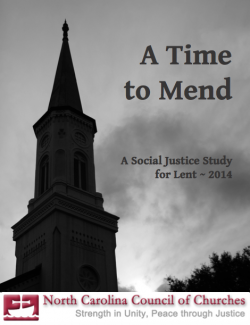 In recognition of our faithful call and of this time in history, the Council’s annual Lenten guide focuses on poverty and the ways we can respond to our sisters and brothers of low-income. We hope you and your family will find cause for reflection and inspiration for action as you share this intergenerational resource together. May we continue building as a nation toward a place where God’s love is felt by everyone through the meeting of basic human needs and the extension of true opportunities for progress.
In recognition of our faithful call and of this time in history, the Council’s annual Lenten guide focuses on poverty and the ways we can respond to our sisters and brothers of low-income. We hope you and your family will find cause for reflection and inspiration for action as you share this intergenerational resource together. May we continue building as a nation toward a place where God’s love is felt by everyone through the meeting of basic human needs and the extension of true opportunities for progress.
Click here to download “A Time to Mend: A Social Justice Study for Lent.”
For many Christians, the somber season of Lent invokes the spirit of self-denial. Setting aside, in these six weeks leading up to Easter, something we value or enjoy becomes a means of honoring Jesus’ sacrifice on the Cross. In that same spirit, Lent becomes a fitting time to reflect on age-old divisions between rich and poor – and on our duty to help uphold those whom circumstance has treated harshly.
For people struggling amid poverty, self-denial is not a matter of choice. It is a lifestyle forced upon them not only during Lent but all year round.
It happens that 2014 serves as a milestone in the long-standing effort, championed by both religious organizations and secular leaders, to reduce poverty’s toll on Americans. It was 50 years ago that President Lyndon Johnson, in his first State of the Union address, raised a battle cry resonating with hope and idealism: Poverty would be targeted in an all-out assault that Johnson likened to a war.
In a country where memories of the Great Depression had yet to fade – where President Franklin Roosevelt had decried “one-third of a nation ill-housed, ill-clad, ill-nourished” – Johnson’s call had enormous appeal. He pressed for and eventually secured the legislative framework we recognize today as the heart of America’s social safety net. This was the brief era that gave us Medicare, Medicaid, federal nutrition assistance, Head Start and a Social Security program strengthened to better meet the needs of people too old to work.
A half-century later, poverty’s raw edge has been blunted. Some critics of LBJ’s “Great Society” agenda discount its effectiveness, but it seems clear that in the absence of programs such as Medicare, millions of Americans would be thrust into that nightmare existence where choices must be made among food, shelter, clothing and medicine.
Yet here’s the bitter truth: Millions of Americans do indeed confront those kinds of choices. Safety net notwithstanding, the evolving economy has left them to scramble for crumbs falling from our national table. As North Carolinians, we have to reckon with the reality that among those struggling to afford the necessities of life are many of our neighbors.
Official measurements of poverty hinge on household income, and the levels that mark the poverty threshold – for example, a little more than $23,000 a year for a family of four — are anything but generous. What’s especially sad is that after declining for most of the second half of the 20th century, North Carolina’s poverty rate has been on the rise.
Figures from the Congressional Research Office, cited by Rob Christensen in The News & Observer of Raleigh, show the rate here had dropped from an appalling 37 percent in 1960 to 12.3 percent in 1999. Yet by 2011, the share of North Carolinians living in poverty had climbed to 17.9 percent, or some 1.7 million of the people who attend our schools, seek treatment at our hospitals, worship at our churches. They’re also the people who harvest our crops, clean our offices and do the other kinds of hard work that return neither much money nor status.
The rate among vulnerable subgroups, including African-Americans, Hispanics and children, is higher still – scandalously so. Law professor Gene Nichol, director of UNC-Chapel Hill’s Center on Poverty, Work and Opportunity, put it this way in another article for The News & Observer: “Over 1 in 4 of our children is poor – 41 percent of our children of color. Think on that. Over 4 in 10 of our babies, our middle-schoolers, our teenagers of color are constrained by the intense challenges of poverty.”
What North Carolina confronts is not a failure of the War on Poverty but an economic transformation that has cut cruelly into the ranks of the middle class even while it has boosted many employers.
Thousands of families who have managed to ride the crest of this state’s burgeoning knowledge industries enjoy the fruits of good upbringing, good education, good timing and of course their own hard work. They are the people who live in our affluent neighborhoods, work in our glitzy office parks, shop in our high-end stores, dine in our fancy restaurants. Across town, meanwhile, or in the crossroads communities that dot our countryside, other people wonder where the next meal will come from. Or the next job.
Unemployment is the true curse that has left so many of our fellow North Carolinians at the end of their ropes. Only a few years ago, this state led the nation in the percent of jobs tied to manufacturing. But as textile, furniture and cigarette companies all underwent epic downsizing related to globalization and shifts in demand, the men and women who had been the backbone of their workforces were caught in the squeeze.
Jobs were being created in new fields such as biotech and data analytics, but they went to those who had acquired the necessary skills. That has left many would-be workers, unable to re-invent themselves, trapped in a limbo of hopelessness. A deep recession has made the situation even worse.
Education, then, lies at the core of any anti-poverty strategy with a chance of success. It is a long-term process, to be sure – but to shortchange our education system at any level, from early childhood to research lab, is to consign untold numbers of our fellow North Carolinians to lives of diminished prospects. Enlightened state leaders will recognize as much.
Fifty years’ worth of struggle against poverty has yielded many victories. But the battlefield has shifted. Direct aid to the poor – for example, food stamps that keep children from going hungry – still is important. What must be expanded are ways for people stymied by lack of opportunity to get ahead, using their natural initiative and drive. That means a rededication by all of us to providing the crucial handholds: education and decent jobs.
The Lenten season, when we reflect on the nature and power of sacrifice, can summon us to reinvigorate the cause of all poverty-fighters by asking more not only of our neighbors seeking better lives but also of ourselves.

